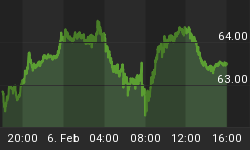Looking for evidence of rebalancing in Europe? Don't look here: German 2012 trade surplus soars despite weak December reports
Germany's trade surplus was the second highest in more than 60 years in 2012, pointing to an underlying resilience in Europe's largest economy, although both imports and exports disappointed in the last month of the year.
Exports rose just 0.3 percent in December from November, compared with a forecast rise of 1.3 percent, and imports fell 1.3 percent against expectations for a rise of 1.4 percent .
Analysts blamed poor demand from the euro zone and beyond for the weakness of exports, and Germans' reluctance to spend for the fall in imports, but pointed to signs of recovery ahead, including a 0.8 percent rise in December industrial orders.
"Imports fell noticeably in December but were stronger then exports over the entire quarter, which really weighed on economic growth," said economist Andreas Scheuerle at Deka Bank.
"Looking forward the sky is brightening. Global early indicators have improved noticeably and give hope that export business will improve again."
REBALANCING
European Central Bank chief Mario Draghi weakened the euro on Thursday with a subtle hint of concern about the impact of the currency's recent strength on a euro zone economy reeling from the impact of searing budget cuts across its southern half.
That undermines Spain, Portugal and others' efforts to be more competitive in markets beyond the currency bloc - but there were signs in Friday's data that they are at least selling more and buying less from Germany.
In 2012 German exports to the euro zone declined 2.1 percent while imports from the single currency bloc rose 0.7 percent. That may largely be a sign of the weak demand in Spain, Italy and elsewhere, but if continued it would go some way to addressing the bloc's long-term problem with Germans selling more goods abroad than they spend at home.
"Germany made a contribution to the rebalancing of the Eurozone in 2012, but offset the inevitable loss with success elsewhere," said Christian Schulz at Berenberg bank.
Sky Brightening?
The US, Germany, China, Japan, UK, Spain, Italy, and in fact every country wants to be a net exporter to create jobs. Mathematically it's impossible.
There is no significant reblancing, only Illusions of Stabilization.
Moreover, in the non-news of the day on Thursday ECB president Mario Draghi went out of his way to sink the euro with his statement "Risks to Downside."
In that article I took a look at the Nascent Recovery in Spain, pointing out Two Things Spain Needs (and Won't Get).
Rebalancing the Wrong Way
It's clear that Draghi wants to sink the euro to help exports. But what needs to happen is for Spanish, French, and Italian exports to soar. Instead exports from Germany have soared (primarily based on renewed unsustainable growth in China).
A sinking euro may help net European exports a bit, but it will not help Spain and Italy in relation to Germany.
As long as all countries remain committed to the eurozone, European rebalancing improvement must come from rising unemployment and/or still lower wages in the rest of Europe relative to Germany.
With Spanish unemployment over 26% and youth unemployment over 50%, how much more "rebalancing" of this nature can Spain take?















